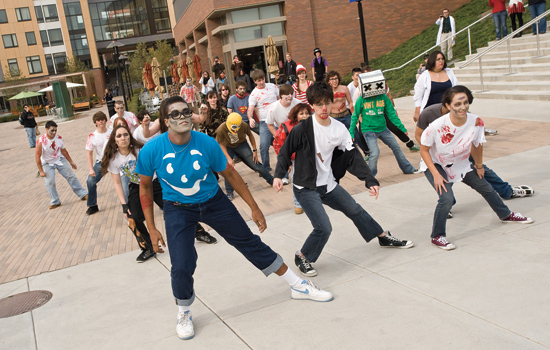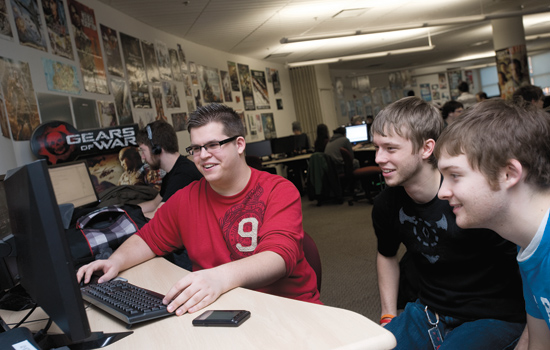Just press play
New game pushes students out of their comfort zones
A. Sue Weisler
Second-year student Robert Massaro, left, made connections by spending time in the computing lab with other students in the School of Interactive Games and Media. Here he is pictured with third-year student Bryan Gawinski, center, and first-year student Christopher Knepper, right.
When Andrew Phelps became head of the School of Interactive Games and Media, he began to meet with the 10 percent of first-year students on the verge of dropping out of the program.
As a professor who worked with upper-level classes, he hadn’t had much interaction with students who had stopped attending classes. But as an administrator, he started thinking about why one group thrived and the other failed. The answer wasn’t intelligence.
“One of the things I noticed about the group in those senior classes is that they had already built networks of support,” Phelps says. “They had already figured out the system of being here. They knew how to survive various kinds of things.”
The challenge became how could faculty, staff and administrators encourage these successful behaviors in low-performing students while at the same time reward high-achieving students, who wanted recognition for being what they called “awesome.”
The answer, not surprisingly from a group of game designers, was Just Press Play.
More than 400 undergraduates in the School of Interactive Games and Media in the B. Thomas Golisano College of Computing and Information Sciences are playing the Web-based game, which launched last fall with the help of a $350,000 gift from Microsoft Corp.
The game is like a scavenger hunt where students earn achievements for everything from finding a professor’s office to visiting a restaurant, exploring a new part of campus or attending a lecture. The game has nothing to do with grades or class credit and can be played by students during their entire career at RIT, and even after they graduate.
“What games tend to be really good at is giving you a big-picture view of things, how things fit together and the milestones along the way,” says Elizabeth Lawley, professor of interactive games and media and head of production for Just Press Play. “For our students, the dragon to be slain is graduating and getting the job is the pot of gold. But students don’t always see what we see, which is that it’s the things that happen along the journey that make them able to slay the dragon.”
Just Press Play aims to change that by creating a roadmap for students that ties together their academic and social experiences and encourages attributes of successful students in the program. Game producers hope to then share that roadmap with others so they can adapt it in a way that will engage their own students.
“We aren’t doing this just because we want to do something fun with RIT,” says Donald Brinkman, research program manager for Microsoft Research Connections. “We really see this as a platform, the creation of a unified game layer for education. We want to spread it in the coming years out to the general population of RIT, other universities, down into the high school systems, all the way down to kindergarten.
“That’s why I say students at RIT are pioneers. If we can all work together, we can make this the beginning of a revolution in education.”
Fitting in
Robert Massaro knows the importance of feeling a connection to the university outside of the classroom. During his first quarter as a freshman in game design, Massaro, who is from Albany, N.Y., says he had few friends, and his lack of engagement showed in the classroom.
But as he spent less time in his room and more in the computing lab, he started to make connections. Those friendships turned into study groups and then into social groups. His grades began to improve and now the second-year student hopes to have a 3.5 GPA when he graduates.
“The first quarter was discouraging, with a large workload and very little down time. But once I met people and started to do things outside of the classroom, I felt like this is where I belong. Just Press Play will help other students with similar problems,” says Massaro, who signed up for the game after it launched last fall.
The game has helped first-year students Jacob Burdecki and Katie Tigue. To earn achievements, they have visited the offices of faculty members, participated in a flash mob and ate off campus with a group of 12 or more friends. For that achievement, they had to upload a photo of the group at a restaurant.
“I have so many upperclassman friends now,” says Tigue, who is from Long Island. “It’s a great way to meet older students.”
Phelps says the game rewards students for visiting faculty because they know students will likely go back and ask for help if they’ve been there once. But there’s a little more to it than just stopping by a professor’s office.
Students have to make Lawley laugh to win her achievement card, which has a code they can then enter into the online game. They have to dance for Elouise Oyzon’s card. Oyzon is an associate professor in the school as well as the game’s lead designer.
Burdecki, who is from Chesterland, Ohio, liked having to tell professor Keith Whittington the best rock and roll band that begins with the letter C. (Creedence Clearwater Revival is the answer to that one, according to Whittington.) After he answered the question, they talked about classic rock and music, and now Burdecki knows a teacher he’ll have down the road.
“It’s definitely made Golisano more of a home,” Burdecki says about the School of Interactive Games and Media, which is in Golisano Hall.
That’s the goal, say the game designers, who report that about 10 achievements are earned a day. Lawley offered another example that the game is working.
To earn the lecture achievement, many of the players attended the keynote speech presented by David Kidder ’95 (industrial design), CEO of the Web service Clickable, who spoke at the entrepreneurs’ conference in October. “A couple of them said, ‘Yeah, I want the card but you know I’m really glad I came regardless of whether or not I get a card. That was a really interesting talk,’ ” Lawley says. “The game serves as a push, a nudge, to do something you might not have otherwise done.”
Moving forward
Kurt Squire, an associate professor of educational communications and technology at the University of Wisconsin-Madison and a researcher of how games can change education, says Just Press Play is unique because it’s built around activities that are proven to help students succeed. And those activities don’t come across as “big brother.”
“Pulling it all together in this way really is forward thinking,” Squire says. “In general I’ve been impressed with the depth of thinking behind it. The design is clever and well thought out.”
Squire says researchers are watching the game closely to see its impact on education, and he expects to see others copy it. “This approach is coming to a school near you.”
He will be particularly interested to see what happens when students and alumni contribute their own challenges and players get a sense from their peers of what it takes to be successful.
Lawley says that will start this spring with early graduates from the Class of 2012. She often gets e-mail from graduates with suggestions for the curriculum. Just Press Play will be a way for alumni to stay connected to the school.
“They get out in the workplace and they realize that they are using this tool instead of that tool,” Lawley says. “I want them to add an achievement into the game. What are the things that once you left here you said, ‘Boy I am really glad I did that’ or ‘Wow, I had really wish I had done that.’ Turn that into something you put into the game.”
The game also will continue to get more sophisticated as activities across campus are rolled in, especially those involving RIT history and wellness. For example, game developers are working on a way for students to earn an achievement by swiping a radio-frequency identification swipe card (RFID) on top of the campus rock-climbing wall and for eating healthy.
There will be achievements associated with library use—perhaps a “magic” book that relates to a class or a campus speaker that students earn an achievement for after it’s checked out and returned.
They also plan to add a way for students to share their accomplishments by using Facebook or their own Web pages and to make the game mobile friendly.
By the time Massaro, Burdecki and Tigue graduate, they’ll have a record of years of achievements that paint a picture of the activities each student values.
Already upperclassmen have embraced Just Press Play. At the end of the fall quarter, an achievement was offered for all players if 90 percent of freshmen in game design and development and new media interactive development passed their first programming class. The goal was to give a reason for the upperclassmen to help the freshmen. And much to everyone’s amazement, it worked.
Thirty-five students attended a weekend study session organized by the upperclassmen, and the game design students earned the achievement. (New media students were very close and there was improvement over past years.)
Teaching peers and learning from peers are skills that will transfer to the workplace. Oyzon says the game in many ways will make sure students leave RIT both textbook- and real-world savvy.
“If they learn the strategy of turning challenges into games on a daily level, I think it puts things into a proper context for students,” says Oyzon.
“It’s all ephemeral and you make it what it can be. You try something new and if it doesn’t work out, you get more lives and try again. That’s a lesson that goes beyond the classroom.”
Microsoft and RIT
The $350,000 gift from Microsoft Corp. for Just Press Play has no strings attached to it, says Donald Brinkman, research program manager with Microsoft Research Connections. There is no requirement to tie the game to Microsoft technology.
What’s in it for Microsoft? “I think there’s an opportunity for Microsoft to make a tremendous difference in education,” Brinkman says.
Why RIT? RIT is part of the Games for Learning Institute, a consortium of universities that explores how to make games both fun and educational, he says. Brinkman also is a fan of Andy Phelps’ research. He points to a past project in which Phelps, director of the School of Interactive Games and Media, published a paper describing an experiment that awarded experience points to students rather than grades. The experiment met with mixed results, but Phelps published a transparent account of both the positive and negative aspects. “Andy is fearless as a researcher. It got me excited to talk to him and thinking about ways we could support his work.”
Over the past 10 years, Microsoft has invested more than $1 million in RIT for game design and development education. More than 100 graduates work for the company.
 Students, faculty and staff in the School of Interactive Games and Media participate in a flash mob performing Michael Jackson’s “Thriller” to earn an achievement in Just Press Play.
A. Sue Weisler
Students, faculty and staff in the School of Interactive Games and Media participate in a flash mob performing Michael Jackson’s “Thriller” to earn an achievement in Just Press Play.
A. Sue Weisler
 First-year student Katie Tigue shows off the achievement cards she earned in Just Press Play. “I have so many upperclassman friends now. It’s a great way to meet older students,” she says.
A. Sue Weisler
First-year student Katie Tigue shows off the achievement cards she earned in Just Press Play. “I have so many upperclassman friends now. It’s a great way to meet older students,” she says.
A. Sue Weisler














